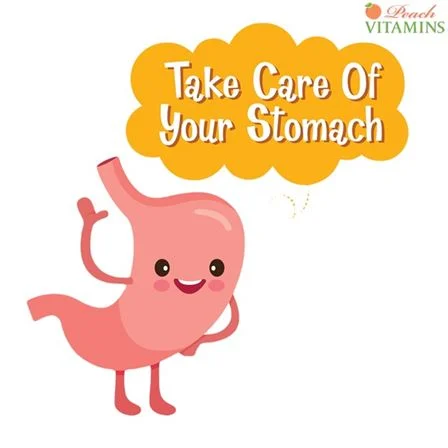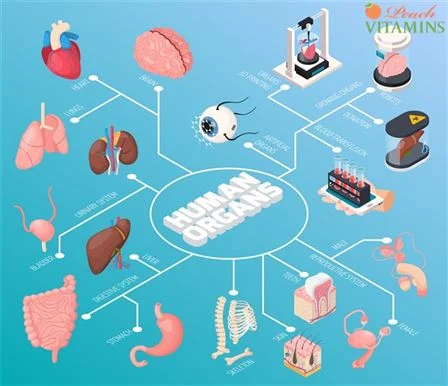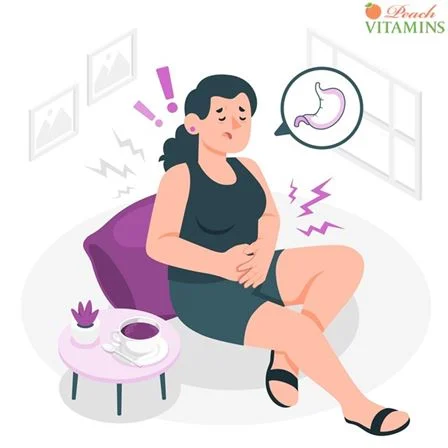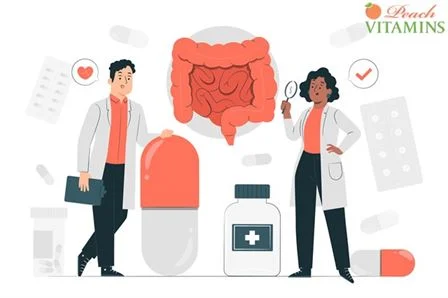What Causes Gut Problems?
We’ve all heard that eating healthy foods will help us live longer, healthier lives. But how long does it take to see results from our diet?
Most people assume that it takes years to notice changes in their health after making dietary improvements. Most people who make small diet changes see noticeable benefits within weeks.
Many experts believe that gut health is the key to longevity and optimal health. And while we may not yet understand precisely why this is true, we know that improving gut health has tremendous potential to extend our lifespan and increase our quality of life.
This article will explain the basics of gut health and how you can begin to improve your gut health immediately.
We’ll also look at some of the most common causes of poor gut health and how you might be able to reverse these conditions with simple lifestyle changes.

Microbiome: The Three Types of Gut Flora
Gut flora refers to the trillions of bacteria living inside our digestive tract. These microbes play many vital roles, including helping us digest food, producing vitamins, and protecting us from harmful pathogens.
Our gut microbiota consists of three types of microorganisms:
1) Bacteria are the most abundant type of gut flora and include beneficial species such as Lactobacillus and Bifidobacterium.
2) Archaea are single-celled organisms similar to bacteria but lack DNA. They’re found only in extreme environments, such as hot springs and deep-sea vents.
3) Fungi are microscopic fungi that live in soil and decaying plant material. Some fungi produce antibiotics that help protect humans from pathogenic bacteria.
There are hundreds of different kinds of gut flora, each with its unique characteristics. We need them all to work together to keep us healthy.
How Do You Know if You Have Good Gut Bacteria
The gut microbiome is an ecosystem of bacteria that live inside our digestive tract. These microbes help us digest food, produce vitamins, regulate immune function, and control mood.
But while we may think of these organisms as beneficial, there is growing evidence that imbalances in the microbiome could contribute to diseases such as obesity, diabetes, depression, autism, inflammatory bowel disease, allergies, asthma, cardiovascular disease, cancer, and more.
Recent studies suggest that the human body contains 100 times more bacterial cells than human cells. This means that the health of our bodies depends almost entirely on the health of our microbial communities.
This makes sense because most of our immune system resides within our gastrointestinal tracts. So when our gut flora is out of balance, our immunity suffers.
To make matters worse, antibiotics kill bad and good bacteria indiscriminately, leaving us vulnerable to infections.
Fortunately, there are ways to improve the health of our microbiomes. We now know that probiotics—live microorganisms that promote healthy digestion—effectively prevent diarrhea, constipation, and stomach ulcers.
Probiotic supplements also reduce irritable bowel syndrome (IBS) symptoms, eczema, and psoriasis.
Additionally, researchers are exploring whether probiotics might prevent antibiotic-associated diarrhea, which affects nearly half of patients taking broad-spectrum antibiotics.
Finally, probiotics may help treat conditions ranging from lactose intolerance to anxiety and depression.

How to Decrease Your Risk of Gut Inflammation
Fortunately, there are ways to decrease your risk of gut inflammation. Here are four steps you can follow to improve your gut health and prevent future flare-ups:
- Eat probiotics regularly. Probiotic supplements contain billions of friendly bacteria that help restore balance to the intestinal environment.
- Avoid antibiotics. Antibiotics kill both good and bad bacteria, which can disrupt the average balance of the gut microbiome.
- Drink plenty of water. Water flushes out toxins and helps keep the intestines clean.
- Exercise regularly. Regular exercise improves digestion and boosts energy levels.
Understanding The Science Behind Probiotics and How to Balance the Beneficial Bacteria You Get
Probiotic supplements are an excellent way to help support healthy digestion. These products contain beneficial bacteria which aid in maintaining a healthy digestive system.
The most common types of probiotics include Lactobacillus acidophilus, bifidobacterium, and Saccharomyces cerevisiae. These microorganisms are found naturally in our bodies and play important roles in helping us digest food properly.
While these products may seem expensive, there are numerous benefits associated with taking them regularly. For example, studies show that regular consumption of probiotics helps maintain a healthy immune system and reduces the chances of developing allergies.
In addition, probiotics also promote weight loss and improve overall health. They have been shown to reduce cholesterol levels and boost energy levels.
Another benefit of probiotics is that they help prevent diarrhea and constipation. This is because they produce enzymes that break down carbohydrates and proteins.
However, it is important to note that while probiotics help support digestive health, they do not replace the importance of eating a balanced diet.
Why Inflammatory Health Issues Are More Destructive to Your Body Than Infections
Inflammation is an important immune response to infection. But inflammation becomes destructive to our bodies when it goes out of control.
Infection is caused by bacteria, viruses, fungi, parasites, and even chemicals. When we get sick, these organisms invade our bodies and cause damage.
But inflammation is much more complex and involves white blood cells, also called phagocytes. These cells engulf pathogens and dead tissue.
They release enzymes that destroy foreign invaders. In addition, they produce substances that attract other immune system cells to help fight infections.
However, when there is too much inflammation, the immune system attacks healthy tissues instead of invading pathogens. This results in chronic illnesses such as arthritis, asthma, diabetes, heart disease, multiple sclerosis, psoriasis, rheumatoid arthritis, and ulcerative colitis.
The most common symptoms of inflammatory diseases include joint swelling, fever, fatigue, loss of appetite, weight loss, and abdominal discomfort.

What Are the Most Common Blood Sugar Issues?
The most common blood sugar issues include low blood sugar (hypoglycemia), high blood sugar (hyperglycemia), and diabetes mellitus. These conditions may occur alone or together.
Low blood sugar occurs when there isn’t enough glucose in the bloodstream. This happens because the body doesn’t produce enough insulin or uses too much insulin. Symptoms include hunger, sweating, dizziness, headache, confusion, irritability, anxiety, nausea, vomiting, shakiness, seizures, unconsciousness, and even death.
High blood sugar occurs when more glucose is in the bloodstream than usual.
This usually results from either an increase in insulin production or a decrease in glucose absorbed by cells. Symptoms include increased thirst, urination, fatigue, blurred vision, dry mouth, frequent urination, muscle cramps, headaches, and weight loss.
Foods That Cause Gut Inflammation
Some foods cause gut inflammation. But some foods help prevent it. So how do we know which ones?
The problem is that our bodies aren’t designed for modern living. We overeat processed food, drink too much soda, and exercise too little. All these factors contribute to an unhealthy gut microbiome.
This means that the bacteria that live inside us are out of balance, and this imbalance affects our health in ways that we may not even realize.
For example, when our gut microbiome becomes imbalanced, it can lead to leaky gut syndrome. The leaky gut syndrome occurs when the lining of the intestines becomes damaged.
But there is hope. By eating healthy, exercising regularly, and avoiding toxins, we can restore the balance of our gut microbiome.
What Happens in Your Body After Eating Bone Broth and How to Prevent Gut Pain Naturally?
The human body is a fantastic machine. We spend our lives trying to keep it running smoothly and efficiently. But sometimes, we do things that make us feel bad. Like when we overeat junk food or drink too much alcohol.
But there is another way to treat yourself right after eating. This is called bone broth. Bone broth is made from bones cooked for hours and hours, and it contains collagen, which helps heal your gut lining.
Bone broth also contains minerals such as calcium, magnesium, phosphorus, potassium, sodium, zinc, iron, copper, manganese, and selenium. These minerals help keep your immune system strong and healthy.
You may wonder why you would want to have bone broth. Well, it is said to improve digestion and boost energy levels.
There are two ways to consume bone broth. One is to boil bones and simmer them for hours, and another is to soak bones in water overnight. Then strain out the liquid and add it to soups, sauces, stir-fries, etc.
Many people say that drinking bone broth makes them feel better. So if you suffer from digestive problems, consider adding bone broth to your diet; it could be the answer you’ve been searching for.

How to Heal the Gut From Food Allergies
The human digestive system is complex, and there’s no single solution to improving gut health. However, some common factors contribute to poor gut health, including food allergies, overgrowth of harmful bacteria, and inflammation.
Food allergies are often triggered by certain foods, such as dairy, eggs, gluten, soy, corn, nuts, and shellfish. These trigger immune responses that cause symptoms such as diarrhea, stomach cramps, bloating, gas, headaches, fatigue, skin rashes, and joint pain.
The overgrowth of harmful gut bacteria causes many problems, ranging from gastrointestinal disorders to autoimmune diseases.
Inflammation occurs when our bodies produce too many inflammatory chemicals called cytokines. Inflammatory chemicals damage cells and tissues throughout the body, causing disease.
They’re produced by white blood cells called macrophages, activated by pathogens, toxins, allergens, and irritants.
Heal the gut from food allergies and the overgrowth of harmful bacteria requires addressing these three main areas:
- reducing exposure to triggers;
- eliminating problematic foods; and
- supporting healthy gut flora.
Reducing Exposure to Triggers
One of the most important steps toward healing the gut is to reduce exposure to triggers. This means avoiding foods triggering allergic reactions, such as milk, wheat, egg, peanuts, tree nuts, fish, shellfish, and soy.
Eliminating Problematic Foods
Once we’ve reduced exposure to triggers, we need to eliminate problematic foods. Elimination diets are helpful because they allow us to identify specific foods contributing to gut health problems.
Some elimination diets require removing all grains, dairy, and processed foods from the diet, while others only remove problematic foods. Regardless of the type of elimination diet used, it’s essential to avoid reintroducing difficult foods back into the diet once they’ve been eliminated.
How Long Does It Take to Improve Gut Health? Supporting Healthy Gut Flora
Finally, we need to support healthy gut flora. Probiotics are beneficial because they help restore normal gut function and balance. There are two types of probiotic supplements: live cultures and prebiotics. Live cultures contain billions of beneficial microbes that feed off prebiotics, indigestible carbohydrates found naturally in foods such as bananas, garlic, onions, leeks, and oats.
Prebiotics are also known as fiber. They’re found in many fruits and vegetables, such as apples, carrots, broccoli, cabbage, cauliflower, cucumbers, lettuce mushrooms, peas, peppers, spinach, strawberries, tomatoes, and zucchini.
There are several ways to consume probiotics, including orally, through capsules, powders, liquids, and yogurt.

How to Achieve Optimum Mood Health Through Diet
Mood disorders affect millions of Americans daily, and stress, anxiety, depression, and other mental conditions often trigger them. Fortunately, there are many ways to improve mood health through diet.
The most crucial step is to eat foods rich in probiotics, prebiotics, and fiber. These nutrients feed beneficial gut bacteria, which produce serotonin, dopamine, GABA, and other chemicals that help regulate moods.
If you’ve been feeling sluggish lately, try adding these foods to your diet. And remember, combining dietary changes with exercise and relaxation techniques is the best way to achieve optimum mood health.
Conclusion
Learning how long does it take to improve gut health can be challenging for people who have never heard about this topic. The health benefits of improving gut health include better digestion, an improved immune system, and overall wellness.
Intestinal health is one of the most critical aspects of overall health. If you want to learn more about improving gut health, check out Ayurvedic practitioner Cosmic Mike with a free consultation to experience comprehensive health improvements to your physical and mental health.
